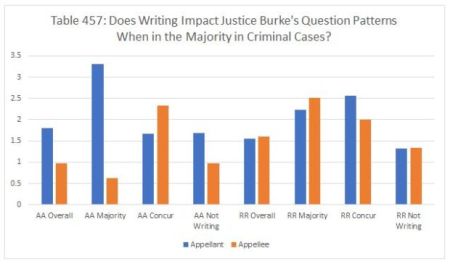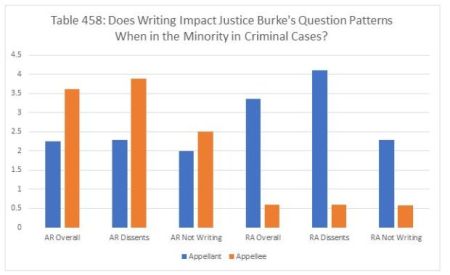Last week, we began our review of the individual Justices' patterns in oral arguments, reviewing the data on Justice Anne M. Burke's questioning in civil cases from 2008 to 2016. Today, we address Justice Burke's patterns in criminal cases.
We report the data for criminal cases when Justice Burke is in the majority in Table 457 below. Consistent with the pattern of the Court as a whole, Justice Burke tends to ask at least slightly more questions of the losing party when she's in the majority. When the Court affirms, Justice Burke averages 1.8 questions to appellants, and 0.98 questions to appellees. Justice Burke averages 1.61 questions to appellees when the Court reverses, and 1.56 to appellants.
Writing the majority opinion has a significant impact. When Justice Burke writes the majority opinion in an affirmance, she averages 3.31 questions to appellants. When the Court reverses in an opinion by Justice Burke, she averages 2.23 questions to appellants and 2.52 to appellees. Only for appellees in affirmances does writing the majority not impact Justice Burke's questioning – she averages only 0.62 questions to appellees in affirmances. Although concurrences are comparatively uncommon, Justice Burke averages somewhat more questions to most parties when she writes a concurrence. In reversals, she averages 2.56 questions to appellants, two to appellees. She also averages 2.33 questions to appellees in affirmances where she writes a concurrence. When Justice Burke isn't writing an opinion, she averages 1.69 questions to appellants and 0.98 to appellees in affirmances, 1.32 to appellants and 1.34 to appellees in reversals.

In criminal cases where Justice Burke is in the minority, she tends to more heavily question the party she's voting against, rather than the party which will ultimately win. In affirmances with Justice Burke in the minority, she averages 3.62 questions to appellees, 2.24 to appellants. In reversals when she's in the minority, she averages 3.35 questions to appellants and only 0.59 to appellees. Writing a dissent has very little impact on Justice Burke's question patterns in such cases. When she writes a dissent from an affirmance, she averages 2.29 questions to appellants and 3.88 to appellees. When she dissents from a reversal, she averages 4.1 questions to appellants, but only 0.6 questions to appellees.

Join us back here tomorrow as we address whether writing an opinion in criminal cases makes Justice Burke more likely to begin the questioning.
The content of this article is intended to provide a general guide to the subject matter. Specialist advice should be sought about your specific circumstances.
We operate a free-to-view policy, asking only that you register in order to read all of our content. Please login or register to view the rest of this article.


